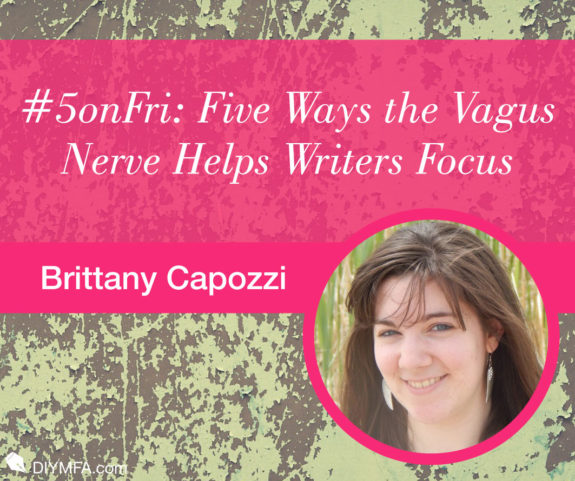More often than not, I look forward to my morning “Writer’s Block”—what I call that time of day where I give myself permission to write, weave, and create in my little square office. Upon stepping into this space, I approach my WIP in one of two ways: either with fear or with ease. Care to guess which approach tends to shadow me more? Yup, fear it is. Do you know how I can move through fear and still be my own leader?
I have a silent partner-in-crime: the Vagus nerve. We actually all have this silent partner. This nerve is the longest nerve in our body. Its signals of fear or ease narrate a story to our facial muscles, heart, lungs, and stomach.
Sometimes I think of it as my accountability buddy. With shallow breathing or anxious thoughts, it tells me that I’m in fight-or-flight mode. I see only a threat in front of me and feel as though I cannot work. With relaxed muscles and even breaths, it tells me that I’m in a calm mode. I don’t see any threats and I can do what I need to do.
We can’t always be stressed, leaving our sympathetic nervous system light on. At the same time, we can’t always be in a resting state, leaving our parasympathetic nervous system light on. Our Vagus nerve needs to be balanced in order for these systems to be grounded. When we are not grounded, we can get in our own way of creating, networking, and essentially building our writing career.
As we writers work alone, yet constantly with fear, we can keep in mind five ways the Vagus nerve helps us to regain focus:
1. The Vagus Nerve Strengthens Our Communication Skills
As a narrator, our job is to be present by communicating to an audience. But if we’re stressed, we can’t pass stories along clearly and concisely. We certainly can’t ask our Ordinary Joe protagonist to convey emotions if we can’t convey and work with them ourselves.
Before anything, we need to understand what we’re thinking, showing, and telling before someone else can pick up what we create. I think of this as needing to nourish our seed of self-communication.
My “seed” is actually a small moon snail shell at my workstation that reminds me to use my vocal cords during Writer’s Block. Recording and listening to my voice grounds my mind and body. Sometimes I read a poem or excerpt of a book out loud. Playing with tone and vibrations through different narratives helps strengthen the parts of our brain that maintain attention, empathy and language.
2. It Taps into Safety as We Approach a Blank Space
As with a tiger in the wild, our nervous system is wired to evaluate the level of potential threats. Showing up in our creative area day after day is a great way to teach ourselves through repetition that as stressed and fearful as we may be about facing our WIP, there is no primal danger.
We create a predictable routine and we know what we need to work on. It echoes the concept of homework after school.
In school, we were taught to remove our emotional brain and use our logical brain in order to complete tasks. As simple as it is, it’s not always easy to do. After all, if we bring our own truths into our WIP, how do we deal with the emotions that may inevitably call on us?
When emotions trigger us, we can come back into a safe space using our body: sit in a chair and inhale through the nose. On the exhale, create a low sound of “vooo” through the lips. Not only does this vibration reset our safety button but it also balances our oxygen and carbon dioxide levels. When we have the oxygen needed, we can think and create at our best.
3. The Vagus Allows us to Laugh into Confidence
Let’s face it, not only do we writers struggle with the ruminating thought “I can’t do it,” but the majority of people struggle with that toward any facet of their lives.
The antidote to self-doubt is, once again, that partner-in-crime, the Vagus nerve. How does it support our wobbly self-confidence? It can make us laugh and lean right into our strength. We can seek out laughter in comedy shows or we can create our own.
Try these exercises:
- Be your own Santa Claus: Pump the naval while shouting “ho ho ha ha ha.” Do this several times and compare how you felt before versus after.
- Mimic a Happy-Go- Lucky Character: Stare at yourself in the mirror with a smile, lift an eyebrow or two, and march the arms back and forth. Then simply give yourself permission to laugh at yourself. And then, with yourself. Don’t forget, you’re your own partner-in-crime during the “Writer’s Block.”
Our body doesn’t know if we force our way into laughing or stream our favorite comedy show. The important thing is that with laughing sounds, oxygen gets moving, as does our motivation and positive thinking.
4. The Vagus Nerve Moves Us through Levels of Engagement
As we focus on Vagus nerve exercises, we’re reminded of how to be engaged. When we attach ourselves to the word “engage” we do just that, attach. Promise. Commit. When engaged with something or someone, we should hold positive energy, empathy, and safety in our body and mind.
“Vooing,” the practice of self-engagement, extends outward toward project engagement. We commit and promise to care for our blank or marked-up sheet of paper. We move into the flow of our WIP.
As long as we treat our craft with respect and keep showing up, we have the ability to pass our gift of the “present” along to the literary community. For example, we can trust our work ethic when we commit to playing catch with a fellow writer. We are better equipped to give and receive.
5. It also Empowers the Writer within Us
Working with the Vagus nerve gives us permission to focus on being our own leader, creator, and educator.
As with the levels of engagement, our partner-in-crime helps us build the strength to become a mentor or example for others. No one can approach his/her/their writing with fear and ease. It’s important to explore what both feel like and how we can coexist with our reactions. To explore and learn is to constantly use the practice of focus.
Tell us in the comments: What was your biggest takeaway about the Vagus nerve and how it helps writers regain focus?

Brittany Capozzi grew up outside of Boston and holds a BA in English from Curry College with a double concentration in Creative Writing and Professional Writing. She draws inspiration from teaching and studying yoga and belly dancing. Feel free to say hi and check out her work at her website, or follow her on Twitter.







